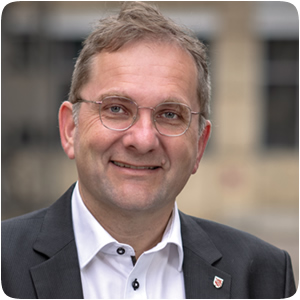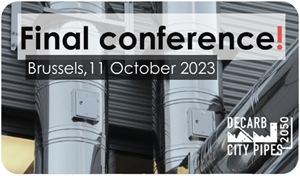 "We no longer need a (gas) pipeline network in residential areas" affirms Stefan Fritschi (pictured), city counsellor and Head of Technical Operations from the City of Winterthur, Switzerland.
"We no longer need a (gas) pipeline network in residential areas" affirms Stefan Fritschi (pictured), city counsellor and Head of Technical Operations from the City of Winterthur, Switzerland.
Winterthur is one of the seven European cities that are taking up the challenge of decarbonizing their heating and cooling systems with the EU funded project Decarb City Pipes 2050.
To achieve climate neutrality in 2050 or before, cities need to tackle a major energy consumer: buildings, and especially their heating and cooling systems. For environmental and, since the Russian invasion of Ukraine, geopolitical reasons, cities are committed to phasing out fossil gas. As Winterthur shows, the alternatives to gas are available: "Decarbonisation in the sector of heat is comparatively simple from a technical point of view. Replacement solutions such as heat pumps are technically fully developed", according to Mr Fritschi. Since 2020, the cities of Bilbao, Dublin, Munich, Rotterdam, Vienna and Winterthur have explored these different solutions and worked out actionable, district-by-district transition roadmaps.
There is no silver bullet: a combination of technical solutions is required. However, green gases are not the best option to decarbonise buildings’ heating.
"Biogas, synthetic methane and also hydrogen will be part of the energy future. But we will no longer heat houses with it, these energy sources are too precious for that. The industry will certainly need large quantities of hydrogen. For these applications, however, we no longer need a pipeline network in residential areas." explains Mr Fritschi from Winterthur.
Decarbonising heating requires long-term planning of energy infrastructures to avoid stranded assets.
And it is important to start in advance, according to Mr Fritschi: “We have been working for years to make this transformation possible at the lowest possible cost. For example, we have not built any new connections to the gas grid for several years. Also, investments in the gas grid are only made where it is mandatory for safety reasons. We used to invest over 3 million in the gas grid every year. Today, not even one. On the other hand, we will invest a lot of money in new district heating networks in the next few years.” In fact, each city involved in the project views district heating networks as a key solution for decarbonised heating and cooling in densely populated areas.
During their journey, the cities are also reaching the limits of their own capacities and have come up with recommendations for changing the legislative framework.
In the case of Austria, there is still a binding requirement for gas grid operators to connect buildings in case the owners request it. Such legislation is no longer sustainable if cities are to make the transition. Recommendations to improve the regulatory framework are valuable results of this project and should be discussed at national and European levels.
 Join us on the 11th of October in Brussels to learn and debate during the final conference of Decarb City Pipes 20250!
Join us on the 11th of October in Brussels to learn and debate during the final conference of Decarb City Pipes 20250!
Cities will share their main lessons in terms of heat planning and on how to make the most of local levers. These are key insights considering the upcoming obligation for all local authorities of more 45,000 inhabitants to develop heat plans, as stated by the recast EU Energy Efficiency Directive adopted in July 2023.